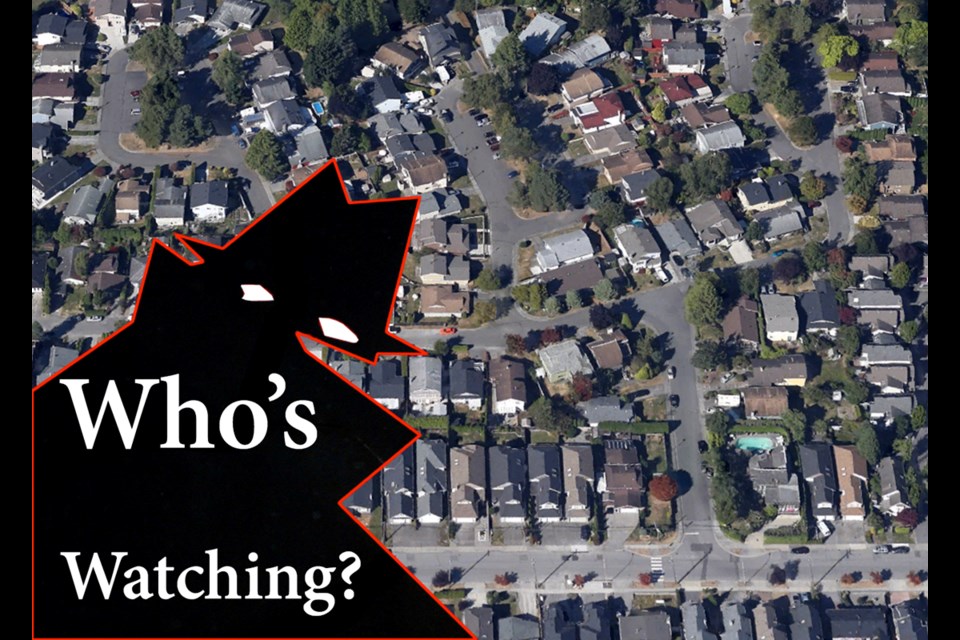A recent spike in property crime in an otherwise relatively safe neighbourhood has residents trying to revive a waning Block Watch program. But shifting demographics may pose challenges to its revival.
Craigflower Drive, off Francis Road, is ground zero for Richmond’s 28 per cent increase in residential break-and-enter crimes in 2014, compared to 2013.
The 18 property crimes committed in Ken Frail and Graham Boyle’s Seafair neighbourhood over the last two months sparked the friends to organize a town hall meeting Tuesday evening at city hall.
“We want to see the (Block Watch) program developed and change the effectiveness of communication,” said Frail, a retired Vancouver Police inspector.
Broken gates, creepy footprints in backyards, tampered locks and smashed car windows has “put the community on edge,” Frail told the Richmond News.
In fact, Richmond RCMP has indicated a male suspect is living in the area; the problem has been finding solid evidence to charge him, despite all the bike patrols, plain-clothed officer surveillance and bait cars.
At the meeting, Frail told an audience of close to 200 people there were “a lot of people not signed up for Block Watch. There were people who were absolutely unaware that break-ins were going on.”
Finding out that most of his neighbourhood is without a Block Watch captain, Boyle felt it was necessary to publicize the angst.
“It’s about being aware. (Block Watch) has worked well up until recently and now I think we’re strained and don’t know where to look for resources,” said Boyle.
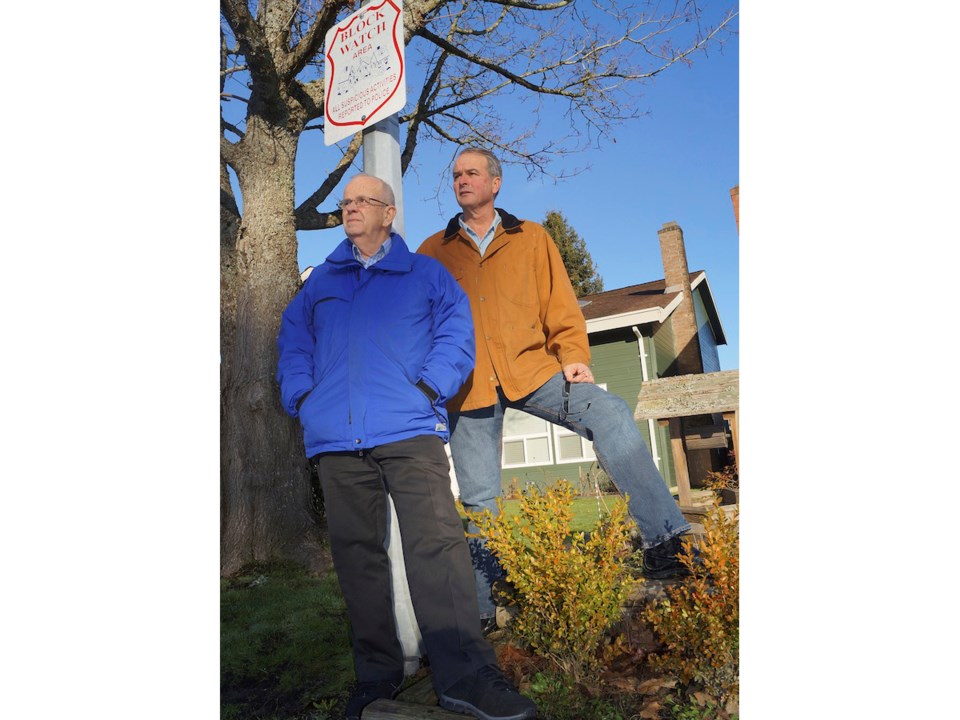
Crime up in 2014
2014 marked a five-year high for residential break-ins in Richmond — by Dec. 1 there were 824 cases, putting the city on pace for 893 for the year.
Per capita, Richmond is better situated than Surrey (2,604 total, estimated) and about on par with Vancouver (2,273 total). But Richmond lags behind Delta, which has half of its population but incurred just 238 break-ins by last December (about half the rate, per capita, of Richmond).
In 2010, when Richmond saw a low of 573 residential break-ins, it ranked six percentage points below the national average (for all break-ins, including businesses).
And while Richmond has seen low rates of auto thefts and thefts from auto, those two figures spiked 50 and 46 per cent, respectively in 2014 over 2013 (to December).
Block Watch is a volunteer-driven crime prevention program, common throughout North America under different names.
Frail fears without a revived Block Watch program, the city may never get back to those rates again.
“We have to ‘target harden’ and really get the crime (level) back to where it was before, which is way down.”
Prevention is possible
According to city data, 87 per cent of 2014 break-ins occurred in non-Block Watch neighbourhoods. There are an estimated 400 Block Watches in Richmond, according to the city. However, according to Richmond RCMP’s Block Watch coordinator, there’s no way to tell how many more are needed, as blocks can vary in size and the city hasn’t compiled estimates. Ergo, it’s difficult to understand how effective the program is or how it can be made more effective, other than noting many more are needed.
Frail is now installing a hunting camera in his backyard — it snaps pictures in the dark when motion is detected.
A myriad of crime prevention tips can be found on the city and RCMP websites: utilize locks, don’t keep garage openers in street-parked cars, protect valuables and don’t announce vacations other than to trusted friends who can collect mail.
Frail’s also telling people to lock up ladders, utilize time-activated outdoor lighting, install alarm systems and trim hedges.
Simon Fraser University criminologist Graham Farrell says crime prevention isn’t “rocket science.”
He notes the long-term decrease in property crime in Canada (property offences are about half of what they were in the early 1990s, according to Statistics Canada) is largely due to the effectiveness of home security systems and locks.
But it also takes all the villagers to secure the village; a critical component of Block Watch is engagement and communication.
“We’d like to encourage discussion to make sure block watches are effective,” said Boyle.
Farrell said block watches are more likely in affluent communities. Surrey, with a population 2.5 times greater than Richmond only has about 650 watches. Sea Island, Seafair and Steveston are Richmond’s wealthiest neighbourhoods (total average income), while City Centre is its poorest.
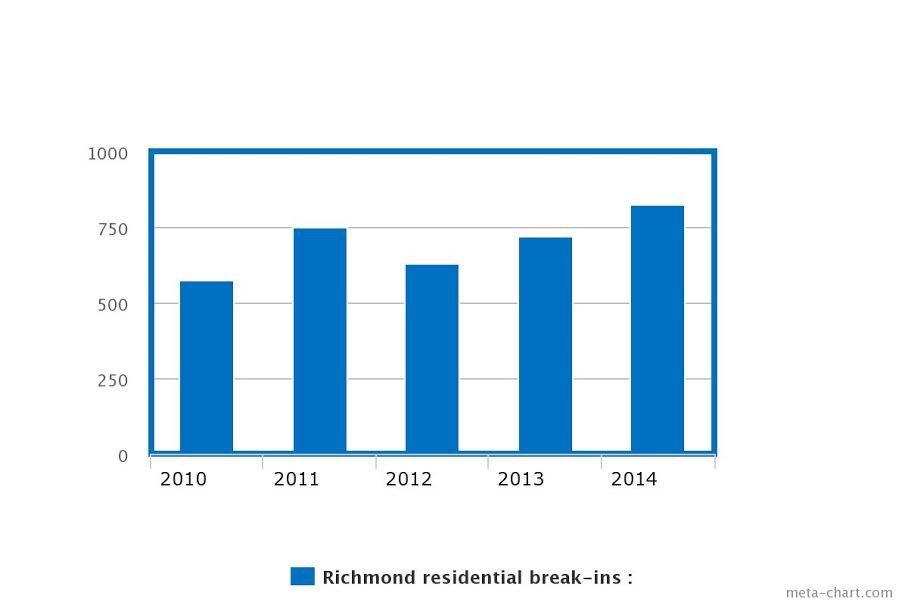
Immigrant factor
Frail raises the point that new immigrants may be on the outside looking in.
“We have people coming from other places now. We have communities that aren’t talking. This (program) isn’t in Mandarin or Cantonese and we’re saying, why not?”
At the meeting the language issue was raised twice, including by businesswoman Wendy Yuan, a recent break-in victim.
Yuan said simple language barriers and cultural misunderstandings have meant the Chinese community is less likely to report crime.
“I ask them (immigrants) why they don’t report and it’s because they have difficulty speaking English,” said Yuan.
Yuan added that in Chinese culture, it’s believed losing something may bring subsequent “protection” in life; she said she knows of people who leave cash in lobbies.
“I honestly believe there are so many new immigrants…and it feeds into these crimes, because (criminals) know they won’t report it,” said Yuan.
Attending the meeting was Coun. Chak Au.
“We (Chinese) have a saying that when you die, you don’t want to go to hell, and when you’re alive, you don’t want to go to the police station,” said Au, who added there’s a public perception that the RCMP don’t take reports seriously .
The RCMP noted there are interpretive services for 9-1-1, but also said immigrants often don’t call police because they think it costs money.
Sgt. Nicole Noonan of Richmond RCMP noted multicultural outreach has been a high priority for police, and when she canvasses neighbourhoods, she has Chinese information cards available.
Report, report, report!
Reporting crimes and suspicious behaviour is paramount for solving crimes, especially when dealing with a prolific, serial burglar, said Noonan.
“Any detail helps,” she said.
For instance, a simple ring of the doorbell but no one being at the door when it’s answered could be a burglar scouting your home, said Noonan.
And it’s not just immigrants who are failing to report suspicious behaviour, said Frail.
“We haven’t been phoning it in, and if we don’t phone it in, it doesn’t help as far as anyone doing an analysis of stats to know we have a problem,” he said.
In 2013, Richmond RCMP launched an online crime reporting website for offenses under $5,000. And, when a crime is reported, it’s shown on an online crime map at richmond.ca, indicating trends by date and location.
Noonan said in order to assist the forensic team, try not to touch a crime scene after reporting it.
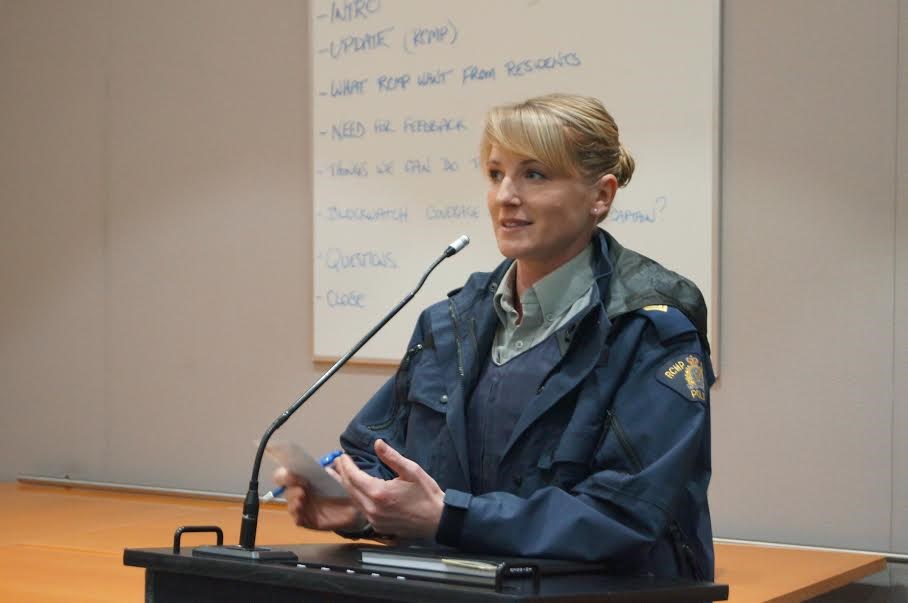
Start talking
As for crime prevention, cameras and locks help, but nothing beats neighbourly interactions — something that’s at an all-time low, according to many residents and stakeholders.
Coun. Ken Johnston attended the meeting and told the News he is “guilty” of not speaking to his neighbours.
Johnston said he noticed a neighbour installing a home security system without speaking to him first about crime in the area.
“We’ve never talked about crime. We have to do more to help each other.”
Johnston and Au promised a safety advisory committee and town hall safety meetings during the election, although none are scheduled.
Meanwhile, online engagement is an option. In Burkeville, Ingrid Trouw organized a 200-plus member Facebook group that shares details about suspicious activity. It also serves as a way to meet new neighbours.
“Everyone has been really appreciative of information sharing, especially suspicious activity,” said Trouw, a Burkevillian since 1991.
The neighbourhood is in flux, she noted; older residents are becoming empty nesters so they’re less likely to chat with neighbours at local schools and parks.
Another online tool to become more aware of crime in your neighbourhood is the RCMP’s email alert system, which informs you about the nature of every crime in your surrounding arterial road quadrant (visit Richmond.ca/crime).
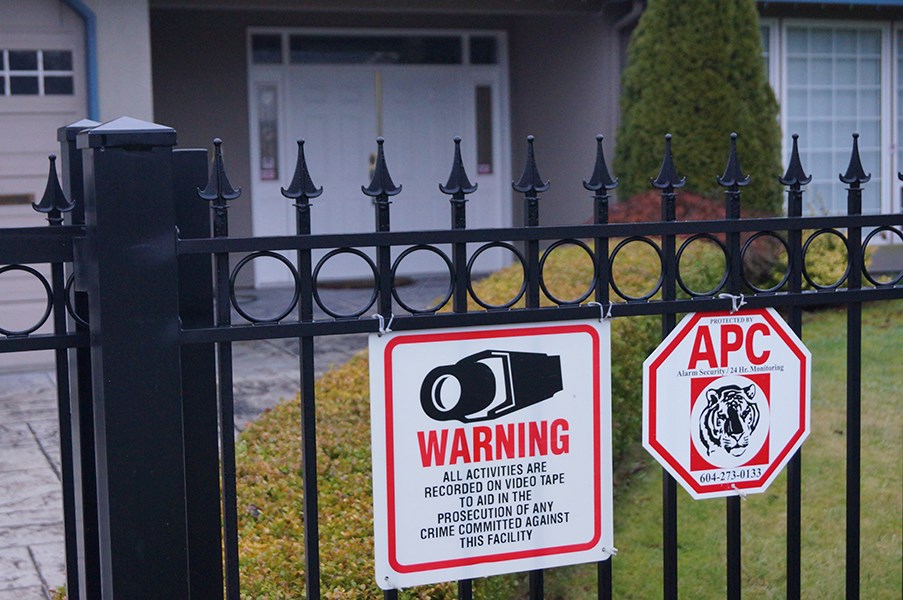
Auxiliary X-factor
Taking more due diligence may be even more important in light of a recent federal policy shift in RCMP auxiliary staffing, which is compounded by the fact Richmond has not received its full compliment of officers, as noted by Au.
Volunteer auxiliary police members perform crime prevention duties such as home “target hardening” checks and attending Block Watch meetings.
But the new policy dictates paid officers must supervise auxiliary members at all times.
“It’s possible for some events we won’t be able to support the auxiliary because of the federal policy,” said Sgt. Paul Poloz of Richmond RCMP’s crime prevention unit.
The change has city councillors worried.
“These people are invested in our community and we depend on them a lot. I hope we find a way to use them to their abilities and it won’t be costly to us,” said Coun. Linda McPhail.
To become a Block Watch captain, you must pass an RCMP security clearance. If you’re interested, call 604-713-2340.
